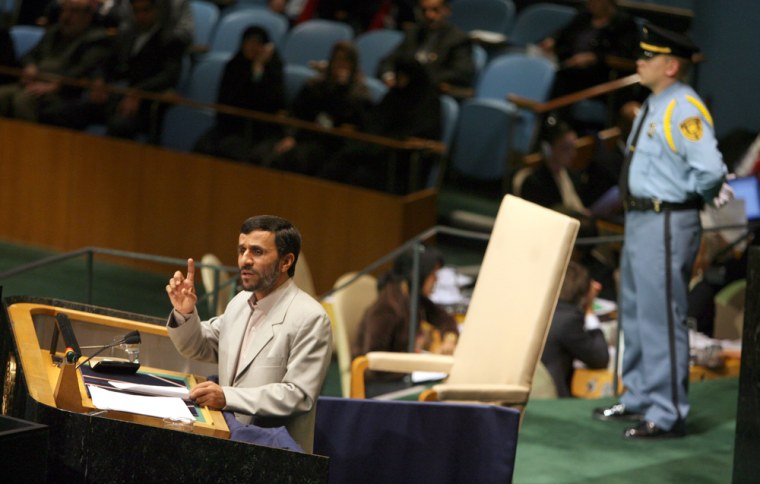TEHRAN, Iran — President Mahmoud Ahmadinejad’s trip to the United States last week has played well with his most important audience: his fellow Iranians.
With a big assist from the government-controlled media, his outspoken stance at the United Nations and beyond received much acclaim at home. Local television news channels billed him as a leader who was not going to be bullied by America; Iran’s newspapers, meanwhile, portrayed him as the people’s president — a patriotic man echoing the voice of the masses and with the nation’s best interests at heart.
In part, this is because Ahmadinejad used his trip to the U.N. in New York for more than just his scheduled speech to the world's leaders at the General Assembly. From a much-covered session with a key foreign-relations think tank to several media interviews — including one with NBC’s Brian Williams, eight minutes of which aired on the "Nightly News" (a huge amount of time for a half hour newscast) — he was seen in many places across the media landscape.
His message centered on the current international crisis over Iran’s pursuit of nuclear technology, with many assertions that his country possesses a right for peaceful nuclear development and that it does not want to develop an atomic bomb.
During almost two hours with members of the prestigious Council on Foreign Relations, he also faced questions about his pronouncements denying the Holocaust and vowing the obliteration of Israel. In general, he toned down his remarks on these subjects in comparison with earlier reports.
Welcomed at home
Ahmadinejad's popularity results in part from his image as a pious man who leads a modest life in a corrupt atmosphere. He was voted into office in 2005 on a platform of anti-corruption and financial reforms. He also champions the belief of many Iranians that nuclear power is a sovereign right, a point of national pride.
From a working class background and living in a lower-income part of southern Tehran, Maryam, 27, is unwavering in her support, especially since the president's New York visit.
Asked if she was disappointed with the fact that he had not delivered on most of his election promises, Maryam, a shop worker who said she voted for him (and asked that her full name not be used), answered with an emphatic “no.” In particular, she thinks Ahmadinejad has been bogged down with the nuclear issue and still has over three years to fulfill his campaign pledges.
She also firmly believes Iran should be able to develop nuclear-energy capabilities, even though when pressed on the question of why Iran (which has huge oil reserves) needs nuclear power, she didn’t have an answer.
Meanwhile, Faramarz Hamid-Pour, 29, a worker in Tehran’s mayor’s office, liked the fact that Ahmadinejad was the first of Iran’s six presidents since the Islamic revolution of 1979 to openly criticize the British (who are viewed with a great deal of suspicion in Iran, mostly for their role in early-20th century machinations over colonial control).
“All of our presidents have openly condemned America, but because of the British [business] interests in Iran they have never been brave enough to criticize the British," he said. "Ahmadinejad is the first one to do so.”
He also believes that Iran should develop nuclear weapons. “We should have a nuclear bomb because then no one will attack us, I don’t want Iran to go down the same road as Iraq. I want my family to be safe. I don’t want to see my house destroyed.”
Some quiet criticism
However, what can be seen as the downside of building up Iran’s nuclear arsenal and having a strongman like Ahmadinejad as president was noted by one Iranian woman who worked for a foreign non-governmental organization.
The woman, who spoke on the condition of anonymity, said that her British boss had been relocated because he and his company felt that, “Iran was not a stable place to invest since the election of Ahmadinejad.”
Other residents of the more affluent districts of northern Tehran, also feel that the president is too religiously extreme (even though he is the only one since 1980 not to be a cleric).
One young man commented that he was worried that, “social reforms may get rolled back, and we would go back to the dark and suppressive days of the ’80s through to the mid-'90s.” (Most of the well-to-do Iranians who agreed to be interviewed did so only on the condition of anonymity.)
“Since Khatami’s presidency we have been able to enjoy more social freedoms," he added, referring to Ahmadinejad's predecessor. "I think Ahmadinejad would like to change that, though it will be difficult.”
